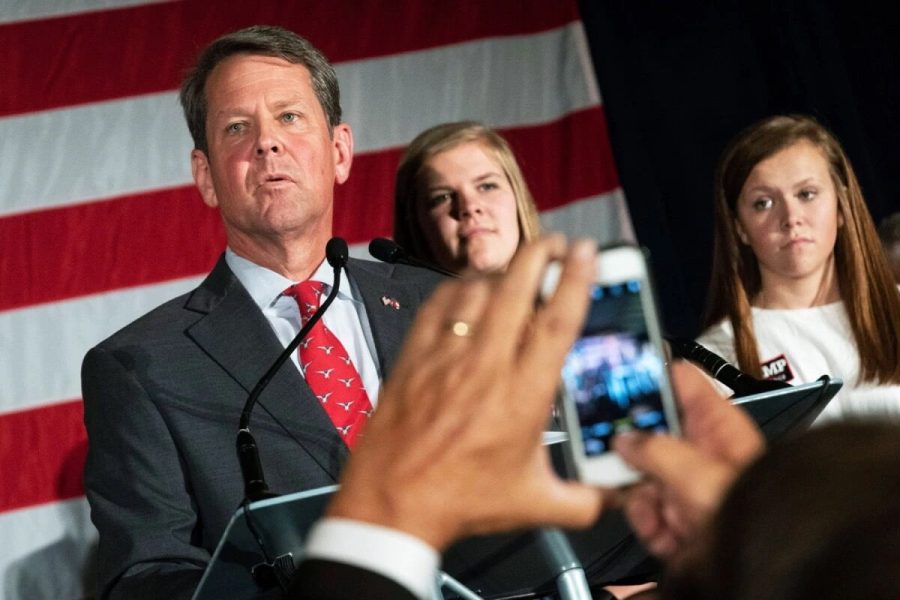Georgia’s Continuous Instances of Voter Suppression
Courtesy of John Amis, Associated Press
Georgia’s Continuous Instances of Voter Suppression
October 21, 2020
As an Atlanta native, I can undoubtedly say that Georgia being the lead story on the six o’clock news is almost never a good thing. During election season, this proves to be even more true. More often than not, the Georgia government is involved in suspicious business connected to state officials, including Governor Brian Kemp, the man who, in a campaign video, said he had a “big truck just in case he needs to round up criminal illegals and take them home himself.”
Since his election in 2018, discussion of voter suppression has become an intrinsic part of Kemp’s and the state of Georgia’s reputation. Before he was governor, Kemp was the Georgia Secretary of State, meaning part of his job description was to supervise elections (voter registration, polling location functionality, etc.). According to USA Today, ahead of the 2018 Georgia gubernatorial election, around 53,000 voter registrations were left pending by the Secretary of State office. Those affected were primarily nonwhite, minority voters. Kemp did not resign from his position as Secretary of State until the day after he won the election that he oversaw.
This is all to say that Kemp does not have a clean history when it comes to elections, despite his office denying claims and accusations of voter suppression. Kemp’s replacement for Secretary of State was Brad Raffensperger, who has faced continued criticism and accusations of voter suppression during his tenure.
So here we are, another election, and Georgia is a complete train wreck once again. Polls opened on Oct. 12 for early voting access, and many saw this as an opportunity to get out and vote early to avoid the inevitable chaos of Election Day. ABC News reported 240,000 votes were cast in Georgia during the first two days of early voting. However, many of these voters were met with absurdly long lines, some with wait times of over five hours.
While it is a valid assessment that the increased number of people who showed up to vote early is one contributing factor in the extensive wait, officials also noted that there were technological problems with the polling equipment, despite it being relatively new. Furthermore, there are a limited number of polling machines in each location in order to take precautions against COVID-19.
According to NPR, one of the primary reasons that lines have become so sizable is largely due to the lack of polling locations in each county, causing more people to populate each location. NPR additionally noted that the increased wait time can be disproportionately observed in “nonwhite neighborhoods where voter registration has surged.”
The Georgia Secretary of State’s records indicate that four out of five new registrations have come from nonwhite voters in Metro Atlanta.
The number of registered voters in Georgia has increased by over 2 million people, but the number of polling locations has simultaneously decreased by 10%, according to Georgia Public Broadcasting’s analysis of state records. In other words, there are more voters and less resources, and there is a significant impact on primarily nonwhite areas of the state.
Secretary of State Raffensperger called the situation a series of “good issues” that were indicative of what could potentially be record high voter turnout on Election Day. This disregards the disparities in voting access for minority communities. It is evident that nonwhite votes are not being prioritized equally.
According to Politico, it is crucial that Democrats get support from Black voters to win swing states, including Georgia. Seeing as Georgia has become a battleground state for this election, it is crucial that every single vote is included.
The trail of deception that has followed Georgia since Kemp’s election in 2018 is unacceptable and extremely disappointing. Frankly, in order for there to be truly accurate and fair results for this election, Georgia needs to get it together. There needs to be efforts by state officials to actively combat voter suppression and ensure that every eligible vote is counted.
There is only so much we can do as citizens to control the actions of government officials. As constituents, our job is to get out there and elect candidates that will not stand for corruption or any effort to suppress the vote.











